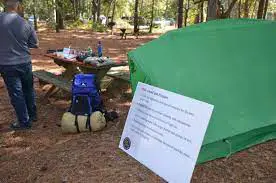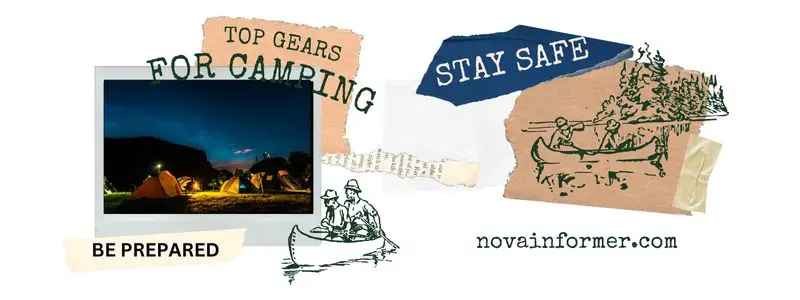Master the art of safe camping with our guide. From wildlife encounters to weather woes, learn how to navigate nature’s challenges.
The great outdoors, the fresh air, and the call of adventure. If you’re like me, you can’t resist the allure of camping under the stars.
But before we dive into this camping wonderland, let’s talk safety.
In this guide, I’ll share some must-know techniques to keep you safe and sound during your camping escapades. From wildlife encounters to handling extreme weather, we’ve got you covered. So buckle up your hiking boots and get ready to embrace nature safely.
Pre-Camping Preparations
Choose the Right Campsite
Picking the perfect campsite is like choosing your favorite flavor of ice cream. You want it just right.
Look for a spot with level ground to avoid waking up with your feet uphill and your head downhill. Trust me; it’s not as cozy as it sounds.
Avoid setting up camp under dead tree branches, as we don’t want any unwelcome visitors falling onto your tent during a midnight storm (unless you fancy a tree hugger’s surprise party.)
And don’t forget to check the rules and regulations of the campsite. We don’t want any park ranger misunderstandings, do we?
Choosing the Right Campsite Tips:
- Look for level ground to ensure a comfortable sleep.
- Avoid areas under dead tree branches or overhanging rocks.
- Check the campsite rules and regulations for any restrictions.
Weather Check
Nature can be unpredictable, so you’ll want to play weather wizard before heading out. Bring your best smartphone or channel your inner meteorologist (cue weather dance) to stay updated on the forecast.
Pack accordingly, and remember that sudden weather changes can happen faster than a squirrel stealing your trail mix. Always prepare for the unexpected – you might just impress your friends with your weather-readiness skills.
Weather Check Tips:
- Check weather forecasts before leaving for your camping trip.
- Pack appropriate clothing and gear for different weather conditions.
- Be prepared for sudden weather changes.
Packing Essentials
Oh, the age-old debate of packing light or packing everything but the kitchen sink. Let’s find a happy medium, shall we?
You’ll want the basics like a sturdy tent, a cozy sleeping bag, and a trusty camping stove to whip up delicious campfire meals.
Don’t forget your flashlight for some late-night nature exploring (and to save you from tripping over rocks like a clown at the circus). Pack your sense of humor too – it’s the best camping companion.
Packing Essentials Checklist:
- Tent, sleeping bag, and camping stove.
- Flashlight, headlamp, or lantern for illumination.
- Extra clothes, including rain gear and warm layers.
Setting Up Camp Safely
Campfire Safety
The campfire is the heart and soul of any camping trip. Roasting marshmallows and sharing stories is what camping is all about.
But remember, with great fire comes great responsibility (cue camping superhero pose). Always build your campfire away from flammable objects like tents, bushes, or your best friend’s favorite hiking boots.
And when it’s time to call it a night, be sure to extinguish that campfire like a pro (because we don’t want a fireman with a water hose visiting us).
Campfire Safety Tips:
- Choose a safe location for your campfire, away from flammable objects.
- Clear the area around the fire pit of any debris.
- Always have water or sand nearby to extinguish the fire when needed.
Tent Placement
Your tent is your cozy sanctuary amidst the wilderness, so choose its location wisely. Avoid low-lying areas where water might pool up during a surprise rainstorm (trust me; waterbeds are so last century).
Make sure you’re not blocking any potential escape routes in case you need to beat a hasty retreat from an overenthusiastic raccoon or a snooping skunk. And if you’re camping with friends, give them enough space to avoid becoming a human game of Tetris.
Tent Placement Tips:
- Choose a high and dry spot to avoid flooding in case of rain.
- Ensure your tent is not blocking any escape routes.
- Give yourself and your camping buddies enough space between tents for a comfortable experience.
Food Storage
The heavenly smell of grilled burgers might attract some not-so-angelic creatures like bears or raccoons.
Keep your food stash secure in sealed containers or a bear-resistant food locker. Remember, bears are smarter than the average picnic basket thief, so don’t underestimate their determination to swipe your snacks. Be bear-safe, and you’ll avoid a sticky (and hungry) situation.
Food Storage Tips:
- Use bear-resistant food containers or lockers to store your food.
- Keep your campsite clean and free from food scraps that might attract wildlife.
- Don’t store food inside your tent to avoid tempting curious critters.
Dealing with Wildlife
Nature’s inhabitants are often curious about their human visitors. You will most-likely encounter wildlife on your camping trip. While it’s an incredible experience to encounter wildlife up close, we want to keep it safe for both parties involved.
Keep your distance and avoid feeding animals (sorry, no marshmallow sharing). A fed animal might become a daring camper’s nightmare.
Be especially cautious around snakes and other critters that may have their own “hidden talents.” Remember, some animals might be camera-shy, so let them enjoy their privacy and snap photos from a respectful distance.
Dealing with Wildlife Tips:
- Observe wildlife from a safe distance and never approach or feed them.
- Learn about the local wildlife to understand their behavior and potential dangers.
- If you encounter a snake, give it plenty of space to avoid any unpleasant surprises.
Water Safety
The sound of flowing water is soothing, but it’s not just there for a relaxing soundtrack. Remember that rivers and streams can be tricky, and currents can be stronger than the urge to raid the snack stash.
If you decide to take a dip, ensure the water is safe, and the depths are friendly (no spontaneous diving contests, please). And don’t forget to pack enough drinking water to avoid a long hike with a parched throat. A hydration station is crucial for a happy camper.
Water Safety Tips:
- Never swim alone, and always swim in designated areas.
- Be cautious of water depth and currents before diving in.
- Bring enough drinking water to stay hydrated throughout your camping trip.
First Aid Kit Essentials
No camping trip is complete without a well-equipped first aid kit. We’re not preparing for the next great ninja battle, but it’s better to be safe than sorry.
Your kit should include band-aids for those pesky blisters (thanks, new hiking boots), antiseptic wipes for minor cuts, pain relievers for any accidental acrobatics, and bug spray to keep mosquitoes from making you their midnight buffet.
You never know when a superhero first aid skill might come in handy.
First Aid Kit Essentials Checklist:
- Band-aids and adhesive tape for minor cuts and blisters.
- Antiseptic wipes and antibiotic ointment for wound care.
- Pain relievers and allergy medication.
The Joy of Darkness: Nighttime Safety
The starry night sky is mesmerizing, but it’s not just about counting shooting stars and making wishes (though that’s a bonus).
When exploring after dark, carry a flashlight to avoid tripping over rocks and roots (unless you’ve always dreamed of a hiking obstacle course).
For some nocturnal entertainment, stargazing is a must. Just make sure you’re familiar with your surroundings to avoid making friends with a tree. Trust me; tree hugs are not that fulfilling.
Nighttime Safety Tips:
- Always carry a flashlight or headlamp when moving around in the dark.
- Use designated trails and avoid walking off-path to prevent accidents.
- Look up and admire the stars, but also pay attention to your surroundings.
Leave No Trace
Mother Nature is our host, and it’s our responsibility to be gracious guests. Leave No Trace is the mantra of responsible camping.
Pack out what you pack in, and don’t leave behind any traces of your camping adventure (except for the cherished memories, of course). Dispose of waste properly, recycle, and avoid unnecessary disruptions to the natural environment.
Remember, we want to preserve the beauty of these camping havens for future generations to enjoy.
Leave No Trace Principles:
- Pack out all trash and litter from your campsite.
- Avoid disturbing wildlife and their habitats.
- Follow established trails to minimize environmental impact.
Handling Extreme Weather Conditions
Nature has its own mood swings, and you never know when it might throw a curve ball your way. Extreme weather conditions can turn a sunny day into a dramatic spectacle worthy of a blockbuster movie.
Prepare for the worst-case scenario by packing rain gear, warm clothing, and extra blankets. Stay updated on weather forecasts and be ready to adapt to the changes (just like a camping chameleon).
Handling Extreme Weather Tips:
- Pack rain gear, waterproof clothing, and a rain cover for your tent.
- Dress in layers to stay warm in cold weather.
- Stay informed about weather conditions and adapt your plans accordingly.
Getting Lost (But Not Forever)
Wandering through nature without a care in the world can be liberating until you realize you’ve strayed a bit too far from camp. Fear not, intrepid explorer. Always carry a map and compass (or use a reliable GPS device).
Familiarize yourself with the surroundings and know how to find your way back to civilization. And if you happen to meet a talking animal offering directions, politely decline – we want real-life adventure, not fairy tales.
Getting Lost Tips:
- Carry a detailed map and compass (or GPS) to navigate your surroundings.
- Learn basic orienteering skills to find your way back to familiar landmarks.
- Tell someone back home about your camping plans and expected return time.
Common Sense and Camping Etiquette
Common sense is the unsung hero of camping. Listen to your instincts and exercise good judgment.
That means no karaoke competitions at midnight or bear wrestling matches (trust me, they’re unbeatable).
Be considerate of fellow campers by keeping noise levels in check, and always follow the golden rule of camping etiquette: treat others’ campsites as you would want them to treat yours – with respect and admiration, of course.
Common Sense and Camping Etiquette Tips:
- Keep noise levels down, especially during quiet hours.
- Respect other campers’ privacy and space.
- Follow any specific rules and guidelines set by the campsite or park.
The FAQ Corner
1. Can I invite Bigfoot to my campfire sing-along?
As much as we’d love Bigfoot to join the festivities, he’s a bit camera-shy and prefers the tranquility of his forest abode. But don’t worry; you can still sing your heart out to the trees.
2. What if I run out of s’mores ingredients?
Running out of s’mores supplies is the ultimate camping disaster. But fear not – that’s why we have secret emergency chocolate reserves hidden in our backpacks.
3. How do I ward off mosquitoes without sounding like a marching band?
If you don’t want to sound like a buzzing orchestra, try natural remedies like citronella candles or essential oils. Not only will you smell great, but the mosquitoes will find your camp less appealing than a five-star restaurant.
4. What’s the best way to deal with a noisy camper neighbor?
A friendly smile and a polite request for a volume adjustment usually work wonders. If all else fails, employ your best ninja moves and sneak away to a more peaceful spot.
5. Can I hug a bear if it looks cuddly enough?
Absolutely not. Bears may look huggable, but they prefer a good old-fashioned wave from a distance. Remember, they’re the original “social distancing” experts.
6. How do I overcome my fear of the dark during camping trips?
Gather around the campfire and share ghost stories with your camping buddies. Soon, your fear of the dark will turn into a fascination with the mysteries that come alive at night.
7. Can I use my tent as a hot air balloon?
While the idea sounds adventurous, tents are not meant for airborne exploration. Leave the aerial acrobatics to the professionals.
8. What should I do if I encounter a friendly alien during a stargazing session?
Offer them some stargazing tips, of course. They might just be tourists from a distant galaxy in need of a good tour guide.
9. Can I make friends with a tree while camping?
Yes, you can. Trees are excellent listeners and can hold some deep-rooted secrets. Just don’t expect them to share their Wi-Fi passwords.
10. Is there a bear repellent dance that actually works?
Unfortunately, bear repellent dances are less effective than a bear-resistant food locker. Stick to proven safety techniques, and you’ll have a bear-y good time.
11. What’s the best way to impress my camping buddies?
Share your newfound knowledge of camping hazards and safety tips. Being a camping safety guru is sure to earn you some well-deserved admiration.
Conclusion: Embrace Adventure and Stay Safe
Congratulations, fearless camper. Armed with these must-know techniques, you’re now ready to conquer the great outdoors safely. Embrace the adventure, cherish the moments, and leave no trace but your footprints.
Remember, camping is about immersing yourself in nature’s beauty, forming unforgettable memories, and sharing hearty laughs around the campfire.
So, gather your camping crew, pack your backpacks, and embark on a journey filled with wonder and awe. May your camping trips be full of laughter, friendship, and tales of your epic adventures under the stars.
Now, go forth and camp safely, fellow adventurers.



